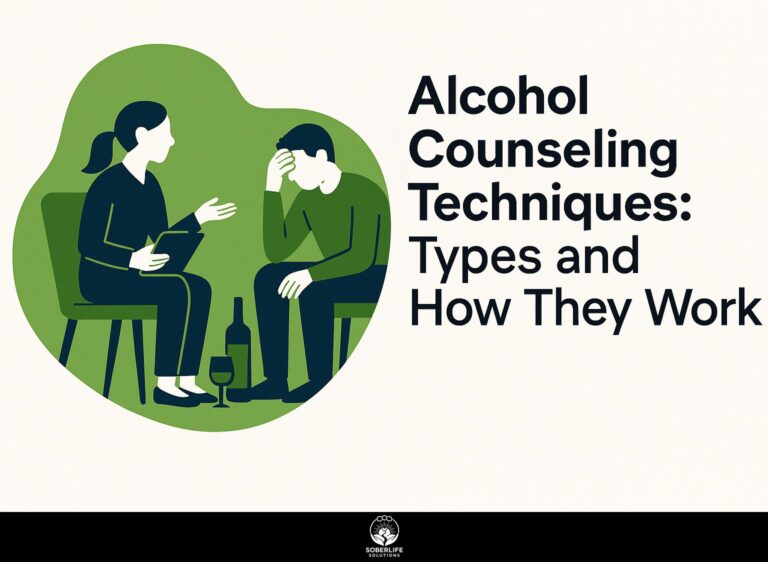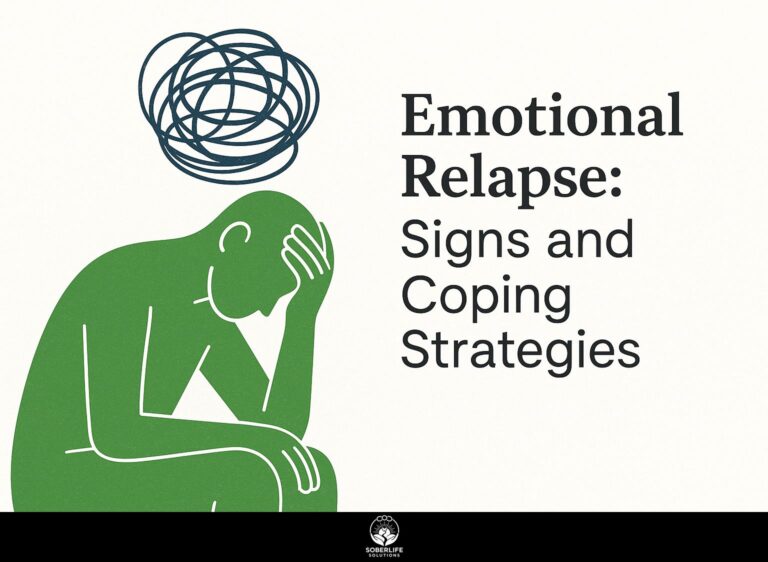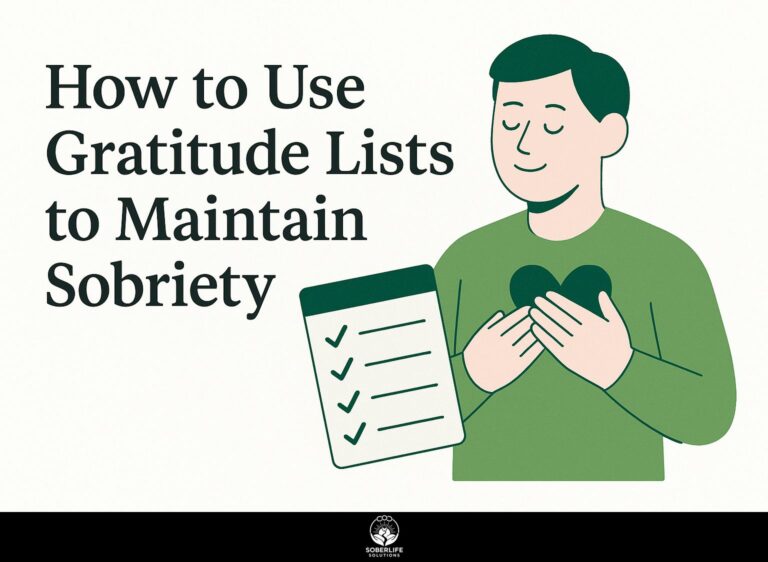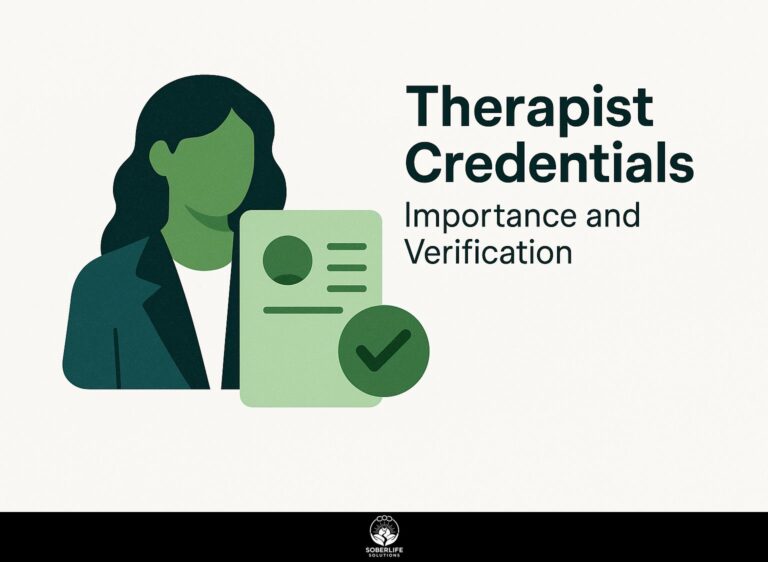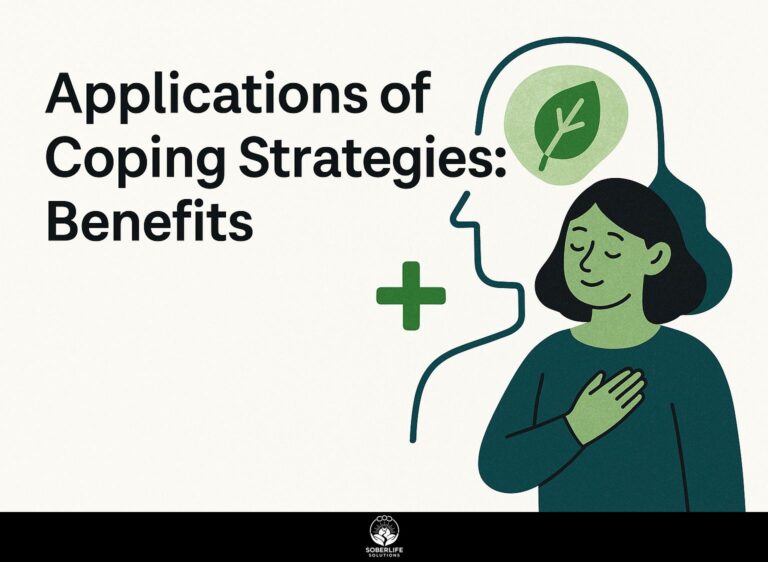How to Access Online Counseling? A Practical Guide
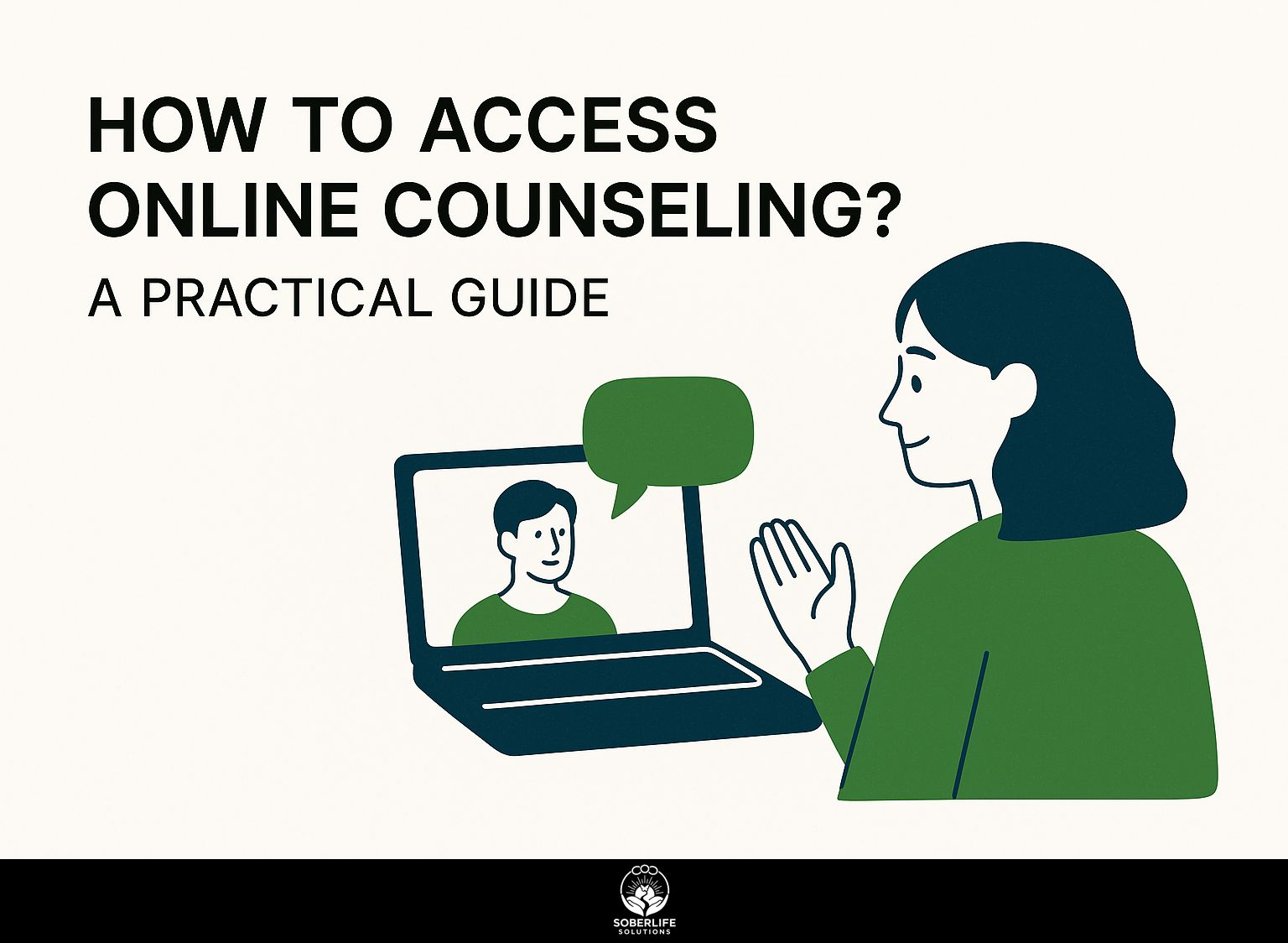
Introduction to Online Counseling
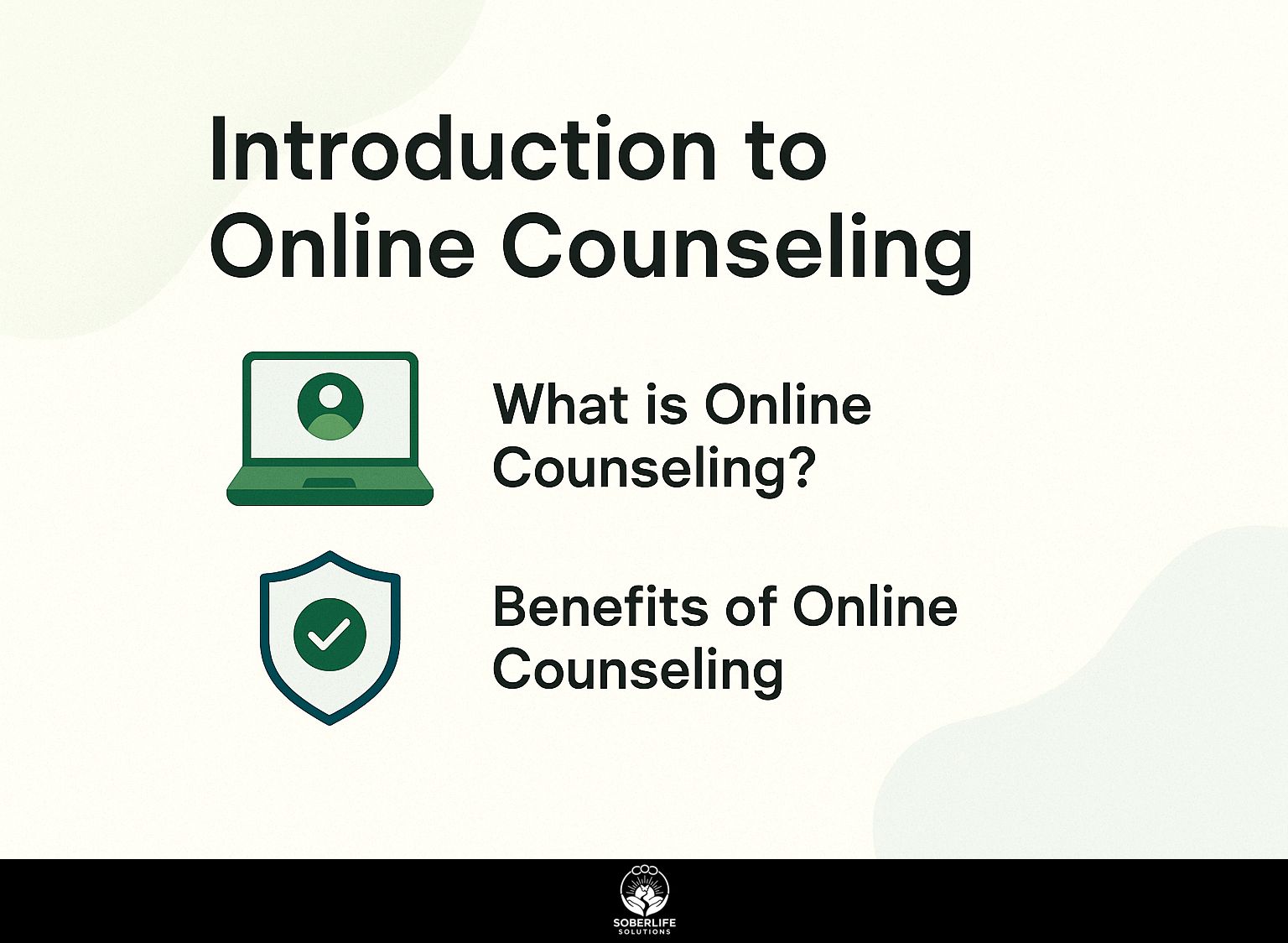
Getting online counseling is very important for mental health, particularly after the COVID-19 pandemic. Unlike traditional therapy, online therapy provides flexible therapy sessions that fit your schedule. Platforms like Two Chairs and services found on Amazon.com, Inc. make accessing the right help simpler. This useful guide will show you how to start online therapy and make sure you receive the support you need.
Key Takeaways:
What is Online Counseling?
Online counseling means having therapy sessions over the internet. These sessions use platforms like Zoom or Microsoft Teams to allow clients and licensed therapists to meet.
This approach offers significant flexibility, allowing clients to choose when and where they want to engage in therapy, which can reduce barriers such as travel time or scheduling conflicts.
For instance, a client can easily participate in a session during lunch breaks or from the comfort of home. Many therapists also provide asynchronous options, using messaging apps like BetterHelp or Talkspace, enabling clients to receive guidance at their own pace.
The flexibility of online counseling has made it more popular, especially when meeting in person is difficult.
Benefits of Online Counseling
Online counseling can reduce the time and cost associated with traditional therapy, with studies showing that up to 80% of users report satisfaction with remote therapy for anxiety and depression.
This type of therapy improves access to mental health experts. For instance, platforms like BetterHelp and Talkspace offer a range of licensed therapists specialized in various issues.
Users can schedule sessions from the comfort of their homes, often reducing session costs to around $60-$80 per week. Many providers now integrate features like chat or messaging, allowing continuous support. According to Scientific American, online talk therapy is found to be just as effective as in-person sessions, underscoring the potential of these digital platforms to deliver quality mental health care.
By using these resources, clients save time and money and participate in therapy in ways that match their personal needs. Additionally, individuals dealing with specific issues, such as alcohol use disorder (AUD), can benefit greatly from these advancements. For those interested in exploring the advantages of online therapy in recovery, our insights on teletherapy’s role in AUD recovery offer valuable perspectives.
Choosing the Right Online Counseling Platform
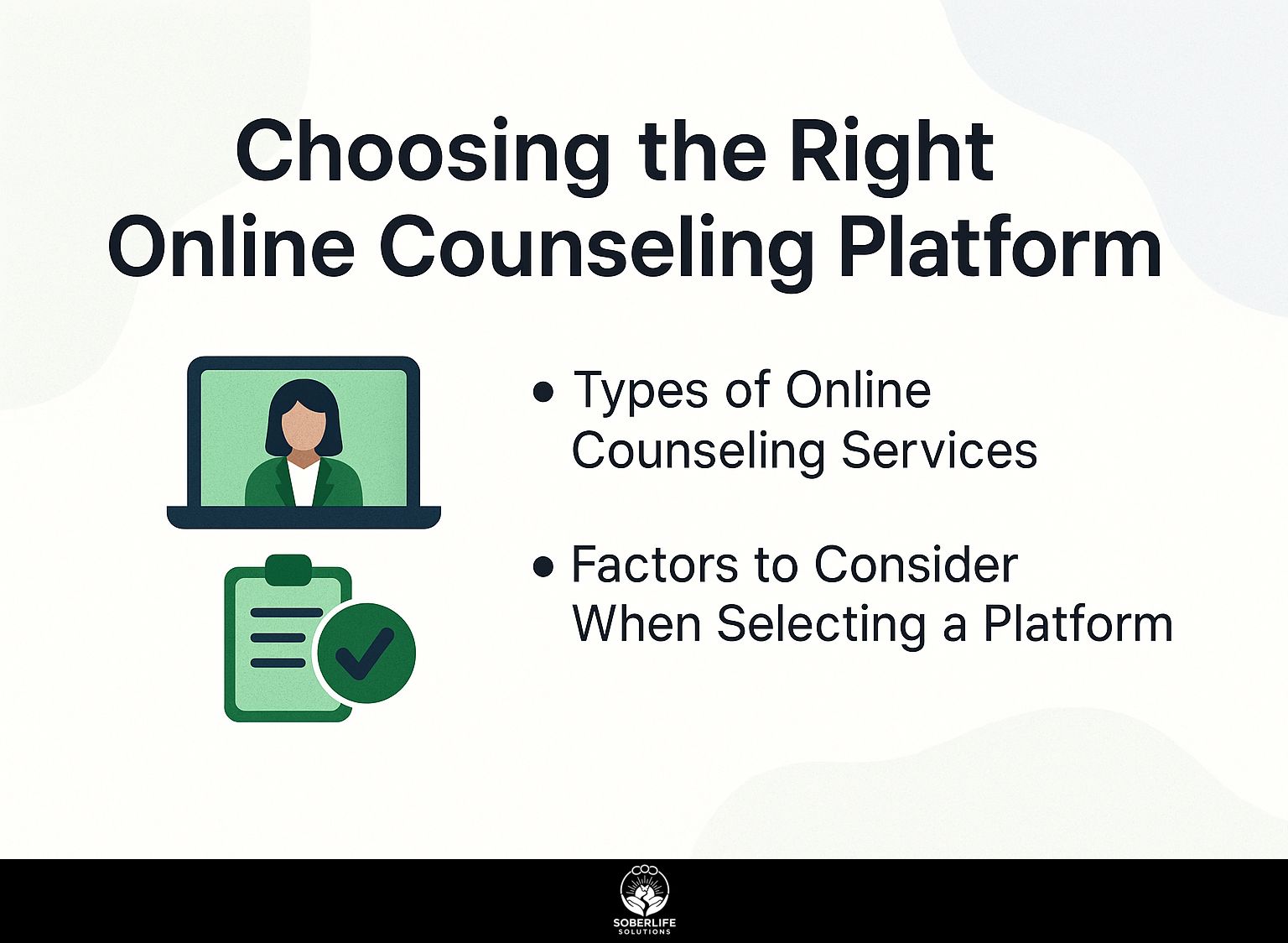
Choosing an online counseling service means looking at different services. Check the therapist’s qualifications, the fees, and if they accept your insurance to find a good option for you. If you’re unsure about therapist credentials, our step-by-step guide on choosing a qualified therapist offers more insights.
Types of Online Counseling Services
The main types of online counseling services are one-on-one therapy, therapy for couples, and group therapy. Each is designed to address particular needs and preferences.
Individual therapy focuses on personal issues such as anxiety or depression, offering a private setting for self-exploration.
Couples therapy helps partners communicate better and resolve conflicts.
Group therapy helps people support each other through similar problems, sharing experiences and knowledge. Those interested in the dynamics and success rates of group counseling might find our insight on Group Counseling for AUD particularly relevant.
To use these services, BetterHelp links users with licensed therapists, while Two Chairs provides professionals chosen to meet particular needs.
By selecting the right type of counseling, individuals can effectively address their mental health concerns.
Factors to Consider When Selecting a Platform
Key factors to think about when choosing an online counseling platform include checking the therapist’s qualifications, knowing privacy rules, and ensuring the site follows HIPAA to protect your personal information. For context, the U.S. Department of Health & Human Services provides detailed insights into HIPAA regulations in telehealth.
Prioritize platforms that offer easy access to therapist qualifications, such as their degrees and certifications. Review user feedback to gauge the effectiveness of the counseling relationships.
Tools like TherapyBlock can help match you with therapists based on your preferences. It’s important to check the platform’s security features; search for things like end-to-end encryption for video calls and secure messaging.
By focusing on these elements, you can choose a reliable platform that meets your needs.
Setting Up Your Online Counseling Account
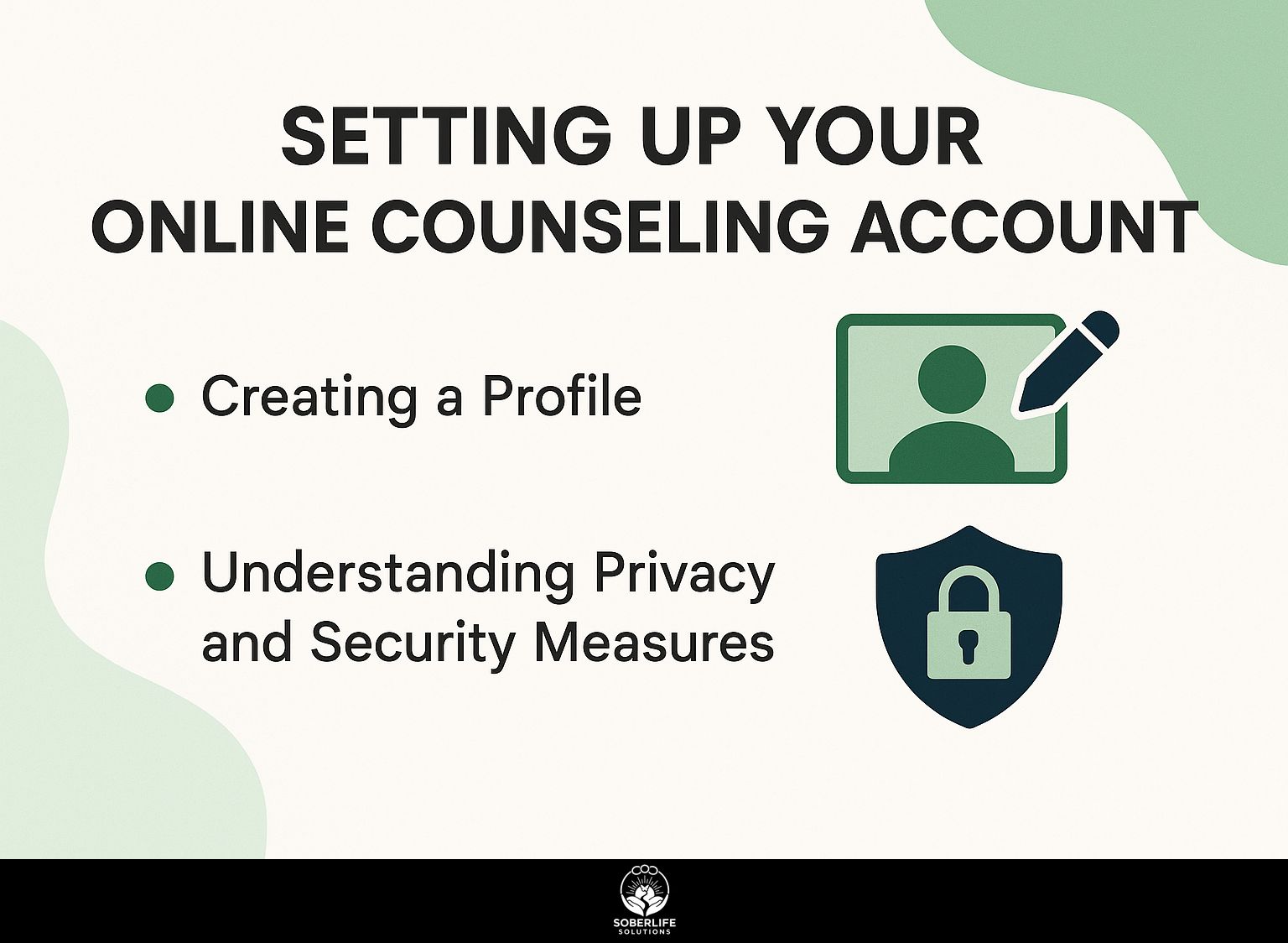
Creating your online counseling account involves setting up a profile that shows your needs while keeping your information private and secure.
Creating a Profile
Creating a profile on an online counseling platform typically requires providing personal information, preferences for therapy styles, and issues you wish to address.
Start by inputting basic information such as your name, age, and contact details. Then, clearly articulate your mental health goals-e.g., anxiety reduction or relationship improvement.
Specify your preferred therapy modalities, like cognitive-behavioral therapy (CBT) or mindfulness practices, to aid in the matching process. Mention any specific challenges, such as depression or stress management.
Carefully completing each part can improve the likelihood of finding a therapist who suits you.
Privacy and Security Measures Knowing how to protect your privacy and security online is important. This guide will help you understand the steps you can take to safeguard your personal information and keep your data safe.
Before starting online counseling, it’s important to know about the privacy and security steps platforms take, like HIPAA compliance, to keep your information safe.
Key privacy measures include data encryption, which protects your communications; secure login methods, which stop unauthorized access; and regular checks to follow regulations.
The Maria Droste Counseling Center uses strong encryption techniques and asks users for multi-step verification.
When evaluating platforms, consider asking the following:
- Does the platform encrypt data in transit and at rest?
- What authentication measures are in place?
- How frequently do they perform security audits?
As highlighted by the Cybersecurity and Infrastructure Security Agency, adopting cybersecurity best practices can significantly enhance the safety of online counseling. Additionally, exploring how virtual recovery groups are trending can provide insights into the evolving landscape of online support (see our detailed analysis for more information).
Preparing for Your First Session
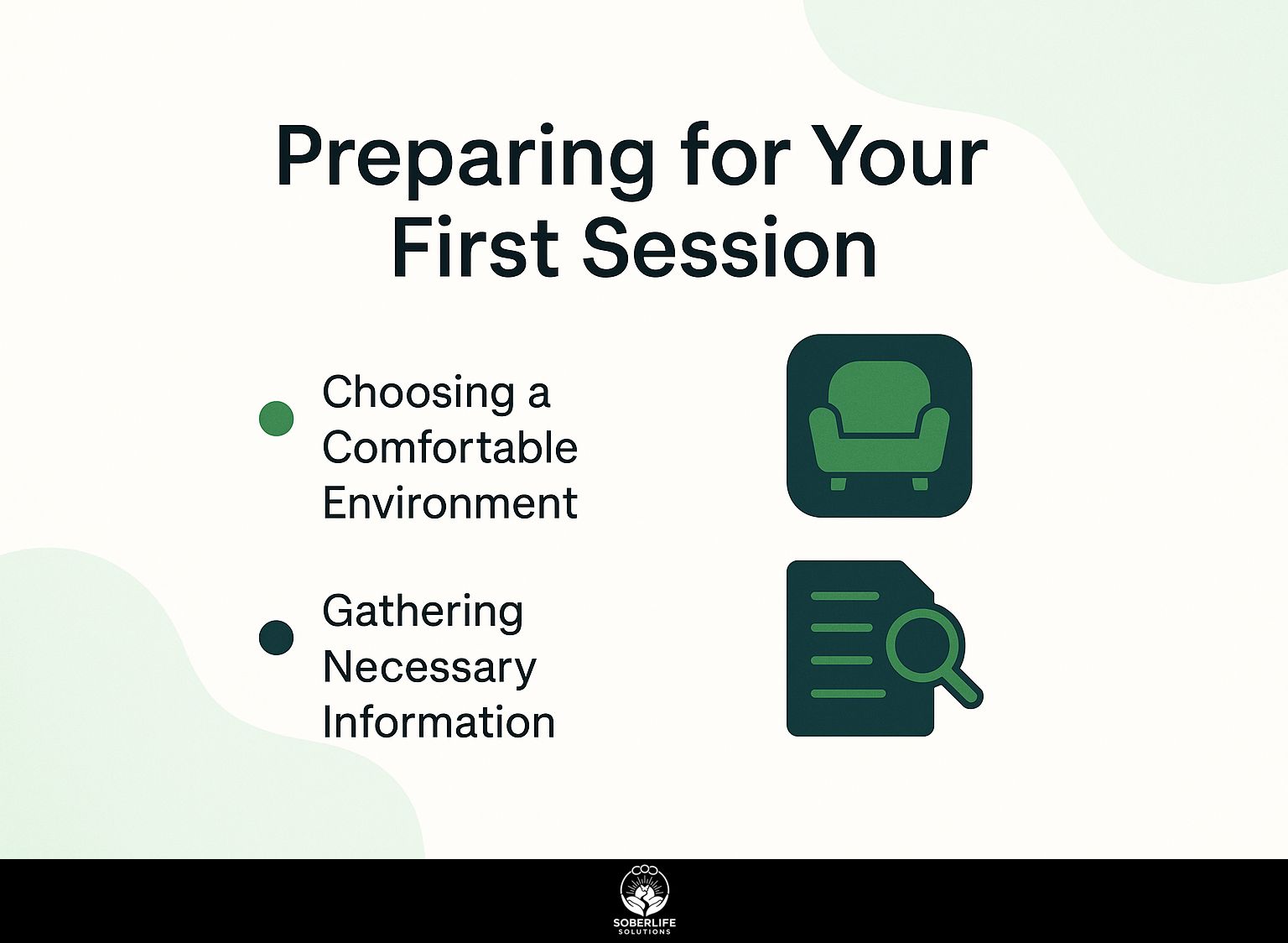
Getting ready for your first online therapy session means setting up your space and collecting personal details to make the session as useful as possible.
Choosing a Comfortable Environment
Choosing a cozy spot for your online counseling meeting can greatly improve how well you connect and talk with your therapist.
To improve your session, try these methods:
- Find a quiet, private space free from interruptions, ensuring you won’t be disturbed by family or pets.
- Check your internet connection in advance to prevent interruptions, and wear headphones for better sound quality.
- Good lighting is important. Pick a bright place so your therapist can better see your body language.
- Establish a calming backdrop, such as a muted wall or a cozy corner, to create a conducive atmosphere for open dialogue.
Gathering Necessary Information
Before your first online counseling session, gather necessary information, including personal history, mental health challenges, and specific goals for therapy.
Consider documenting specific instances that showcase your challenges, such as anxiety triggers or difficult social interactions.
Jot down essential questions you may want to ask your therapist, like their approach to treatment or how progress is measured.
Tools like Notion or Google Docs can organize these notes well.
Sharing this information helps your therapist understand your needs and lets you take part in your treatment.
What to Expect During Online Counseling
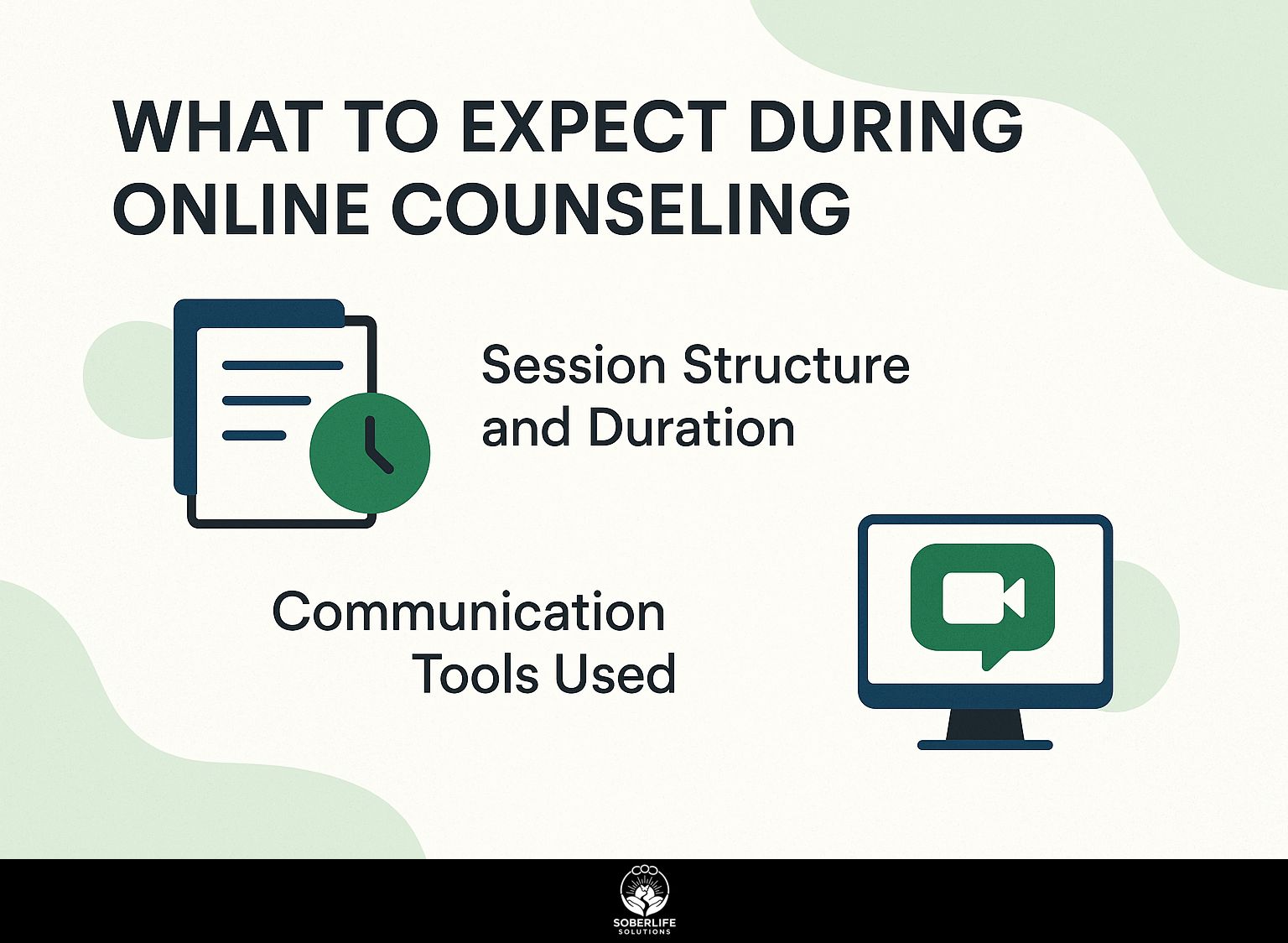
Knowing what occurs in online counseling can make you comfortable and clarify its process, which improves its usefulness.
Session Structure and Duration
Most online counseling sessions last between 45 to 60 minutes, with a structured approach that includes check-ins, discussing current feelings, and goal-setting.
At the beginning of each session, therapists often initiate check-ins to gauge how clients are feeling, creating a safe space for sharing.
From there, they collaborate to establish clear objectives, focusing on what the client wants to achieve during that session or later.
Individual therapist styles may vary; some might emphasize more interactive methods, using tools like worksheets or mindfulness exercises, while others may prefer a discussion-based approach.
This approach ensures each session addresses the client’s specific needs and progress.
Communication Tools Used
Using communication tools like video calls through Zoom or chat features on therapy platforms helps people stay connected and engaged during online counseling.
These platforms allow for real-time communication and include features that address various therapeutic needs.
For instance, Zoom allows screen sharing, which is beneficial for visual aids, while apps like BetterHelp and Talkspace offer text-counseling features, providing clients with a written record of their progress.
Safe messaging choices protect privacy, which is key for trust. Therapists often find these tools help them understand emotional signals better, resulting in care that fits individual needs and faster solutions to client problems.
Follow-Up and Continuing Care
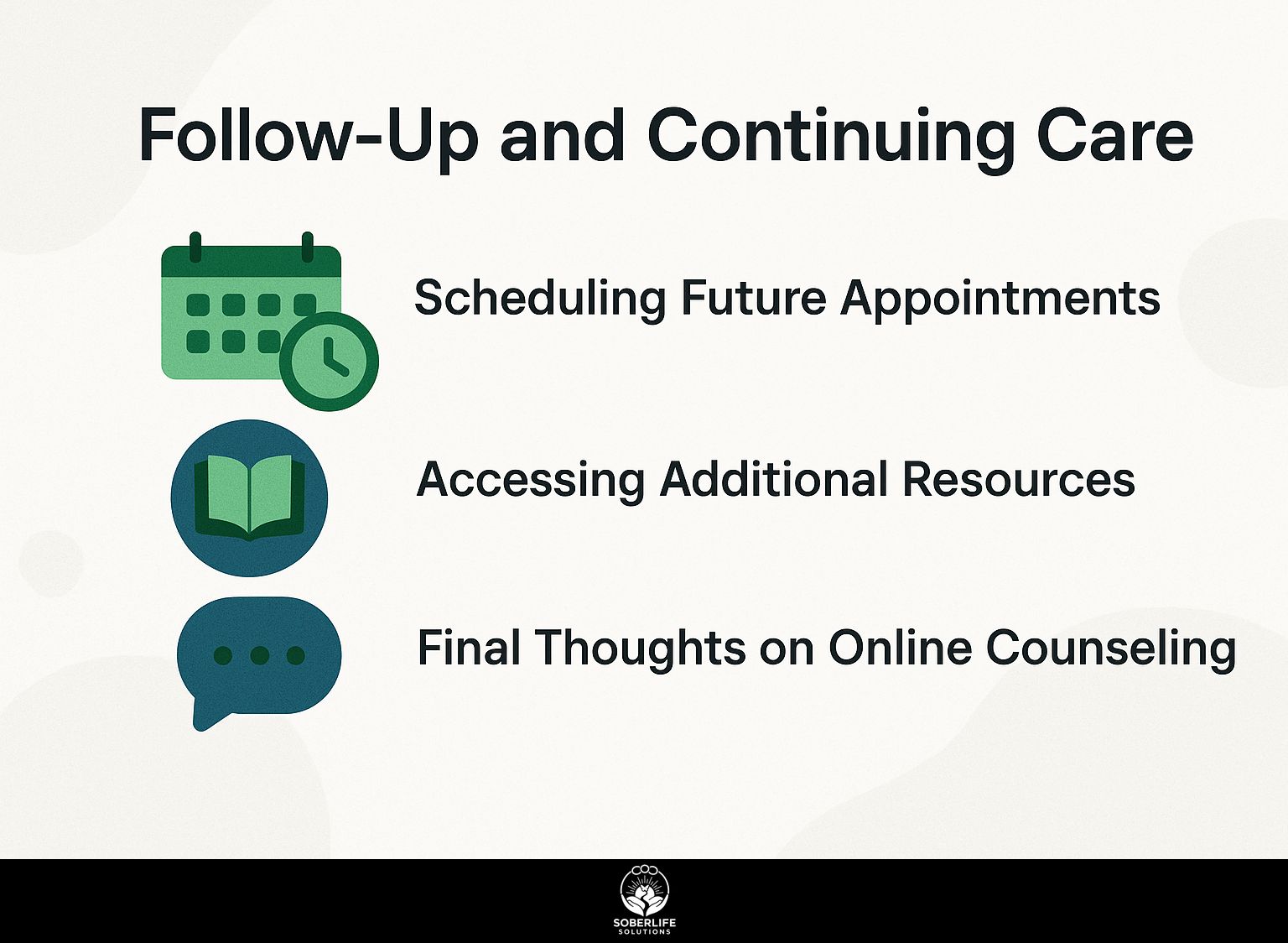
Continuing to check in after your online therapy sessions is important for ongoing help and keeping up with improvements in your mental health path.
Scheduling Future Appointments
After your first session, you should schedule follow-up appointments to stay on track with your treatment and check your progress.
To effectively schedule these sessions, consider using tools like Google Calendar or Calendly, which allow you to set up recurring appointments with ease.
Aim for a consistent routine, such as bi-weekly appointments, which can help solidify the therapeutic relationship and maintain momentum in your progress.
Talk to your therapist about the times or days you prefer, as this can help you stay dedicated to the sessions.
This active method encourages responsibility and helps you regularly move towards your personal goals.
Accessing Additional Resources
Many online counseling platforms provide extra resources like articles, videos, and forums to support your mental health progress between sessions.
For instance, platforms like BetterHelp and Talkspace provide educational articles and video content that address various mental health topics, from anxiety management to coping strategies.
Community forums on sites like Moodfit encourage peer discussions, allowing users to share their experiences and advice.
Apps like Headspace and Calm offer guided meditations and wellness exercises that users can add to their daily schedule, which can include beneficial practices such as breathing exercises for managing urges.
These resources complement professional therapy, ensuring you have support and guidance outside of your scheduled sessions.
Final Thoughts on Online Counseling
As online counseling grows, it provides a helpful treatment option for those looking for support with mental health issues like anxiety and depression.
Many platforms, such as BetterHelp and Talkspace, provide easy access to licensed therapists via text, audio, or video sessions. Users can select their preferred communication style and schedule appointments that fit their lifestyle.
For instance, BetterHelp offers a subscription model starting at $60 per week, which allows unlimited messaging between sessions. Using online counseling offers privacy and convenience, while helping people find professionals who match their particular needs.
Remember, asking for help shows strength. There are many online resources available to support you.
Frequently Asked Questions
What is online counseling?
Online counseling is therapy done over the internet, often using video calls or messaging apps. It allows individuals to receive mental health support from a licensed professional from the comfort of their own home.
How do I access online counseling?
To access online counseling, you will need a computer or device with internet connection. You will also need to find a reputable online counseling platform and sign up for an account. From there, you can browse through available therapists and schedule a session.
Is online counseling as effective as in-person therapy?
Yes, online counseling has been found to be just as effective as in-person therapy for many mental health concerns. Many individuals actually prefer online counseling as it offers more convenience and flexibility.
Can I access online counseling from anywhere?
As long as you have access to a computer or device with internet connection, you can access online counseling from anywhere in the world. This makes it a great option for people who live in remote areas or have limited access to mental health resources.
How can I keep my online counseling private and confidential?
Most reputable online counseling platforms use secure and encrypted technology to protect the privacy and confidentiality of their clients. Therapists must follow strict confidentiality rules, the same as in an in-person therapy session.
Can I choose my own therapist for online counseling?
Yes, you can browse through a variety of therapists on most online counseling platforms and choose the one that best fits your needs and preferences. Remember, some therapists might not have many openings, so you should book your sessions ahead of time.

